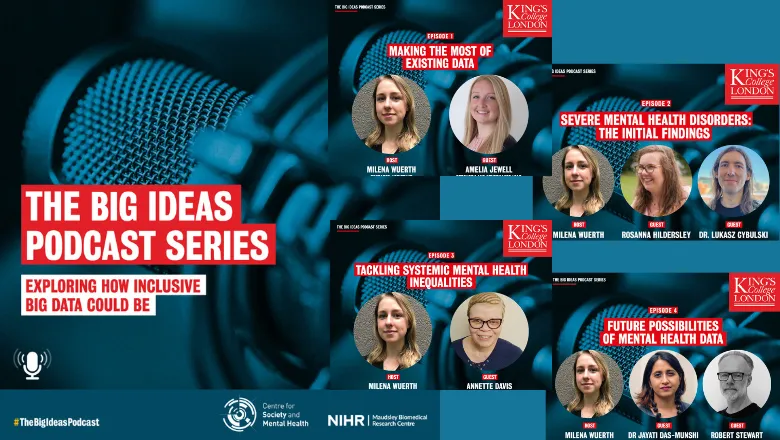Social and Economic Predictors of the Severe Mental Disorders: The SEP-MD Data Linkage Study
There has been limited research on the impacts of social and environmental conditions on psychoses and other severe mental health conditions, and few studies have focused specifically on the experiences of minority ethnic groups.
Routinely collected data such as census from England, has the potential to provide insight on the relationship between severe mental illnesses and social indicators such as migration status, housing, education and employment.
Our project links data from the Census with clinical records from one of Europe’s largest secondary mental health providers, South London and Maudsley NHS Foundation Trust, which provides mental health care to an ethnically diverse, urbanised location in South East London, with a catchment area of 1.3 million people.
This data linkage is unique because it provides details on social and economic conditions which are often not included, missing or captured inadequately in standard electronic health record systems.
Through advanced statistical methods and informatics, we can analyse the data to better understand relationships between mental health, employment, ethnicity and overlapping forms of disadvantage. This can inform current service, treatment and policy concerns relating to the severe mental illnesses.
Data linkage
South London and Maudsley NHS Foundation Trust allows access to anonymised health records through the Clinical Record Interactive Search (CRIS) system. The clinical dataset includes the records of individuals with a diagnosis of severe mental health conditions, including Schizophrenia-spectrum disorders, Bipolar Affective Disorders and non-organic psychoses.
In the SEP-MD podcast 'The Big Ideas' researchers discuss the data linkage between CRIS and the Census and what it involved.
Social indicators are provided by the linked Census datasets. Individual-level Census records from 2011 were linked to records from CRIS and to death registrations
Through this data linkage we are exploring how neighbourhood and individual-level factors are related to mortality, in-patient admissions, disability and long-term worklessness in people with severe mental health conditions. We will also study ethnic inequalities to deepen our understanding of disparities in outcomes. In the future, we plan to expand our analyses to understand social and economic determinants for other mental health conditions.
SEP-MD Podcast: The Big Ideas

The Big Ideas is the SEP-MD's podcast series explores how data shapes our understanding of health and inequalities and how to make the collection and use of data more inclusive to inspire a more equitable future.
There are four episodes:
1) Making the most of existing data
2) Severe mental health disorders: the initial findings
Outcomes & Impact
After working with the Office for National Statistics to link the mental health records to Census 2011, the team have developed a number of key investigations.
Initially, the team explored reasons for non-linkage of census data to electronic mental health records (CRIS). Using the linked data, the team are currently exploring social and economic determinants of long-term worklessness, poorer self rated health, disability and mortality in people with mental disorders.
The linked data is also being used to support a number of PhD projects, including a study of urbanicity and onset of mental health conditions, and a study of inequalities in access to NHS Talking Therapies.
Some of the insights from this work are featured in the SEP-MD podcast episode on 'Severe mental health disorders: the initial findings'.
Our SEP-MD Service User and Carer Advisory Group (SUCAG) has worked closely with us, helping to design the studies, interpret the findings and share our results with the wider public.
You can hear more about the SUCAG on our project video which introduces the different aspects of SEP-MD and in our podcast episode 'Tackling systemic mental health inequalities' which also discusses the patient and carer race equality framework (PCREF).
The study is also now listed on the Catalogue of Mental Health Measures, an easy-access interactive catalogue of mental health and wellbeing measures in British cohort and longitudinal studies.
Our Partners

UKRI ESRC

NIHR Maudsley Biomedical Research Centre
Principal Investigator
Investigators
Affiliations
Funding
Funding Body: Economic and Social Research Council (ESRC)
Amount: £200,000
Period: January 2020 - June 2023




